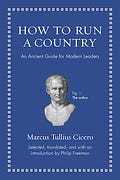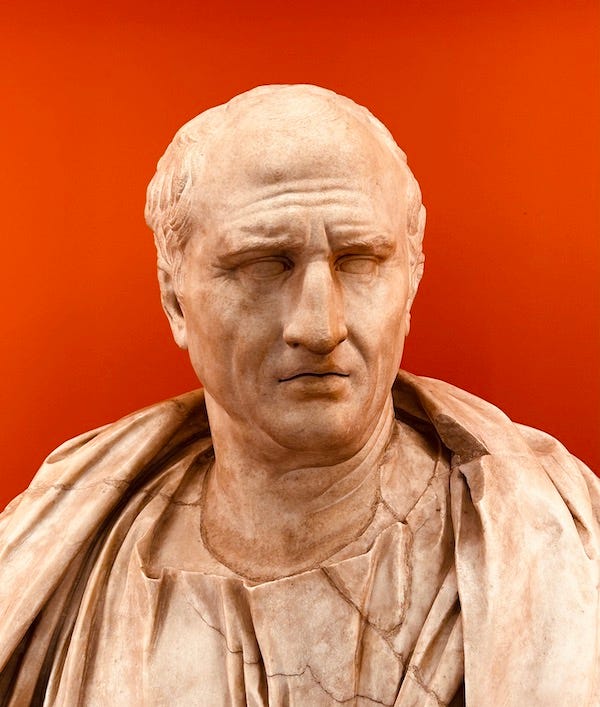[Based on How to Run a Country: An Ancient Guide for Modern Leaders, by Cicero, translated by Philip Freeman. Full book series here.]
Marcus Tullius Cicero knew how to run a country. He did it, very successfully, during the year of his Consulship of the Roman Republic, in 63 BCE. In fact, not only did he carry out the normal functions of a Consul, the highest office in what we would today call the executive branch of the Roman government, he also managed to uncover and successfully defeat a conspiracy against the State orchestrated by the disgruntled nobleman Lucius Sergius Catilina.
But Cicero wasn’t just a statesman (and very successful orator and public advocate), he was also a philosopher. Which means that he took time to reflect and write about crucial issues concerning government. How should a good society be structured? Indeed, what do we mean by a “good” society? What is the source of just laws? What sort of balance of powers should we aim for?
These are questions that still concern us today, and to which we are still struggling to find good answers. Philip Freeman, the translator of various excerpts of Ciceronian works that Princeton Press collected under How to Run a Country: An Ancient Guide for Modern Leaders, reminds us that John Adams, the second President of the United States, said this while reading a biography of Cicero:
“I seem to read the history of all ages and nations in every page—and especially the history of our country for forty years past. Change the names and every anecdote will be applicable to us.”
Indeed, How to Run a Country ought to be standard reading for any modern statesman. Which, actually, used to be the case until not long ago. Cicero was not only the trigger of the Italian Renaissance, he was also reliably found on the bookshelves of modern figures ranging from the American Founding Fathers to Winston Churchill. It is a sorry symptom of the times we live in that I simply cannot imagine most contemporary leaders having that sort of book at hand.
Cicero wrote two major treaties in political philosophy, De Re Publica (On the State) and De Legibus (On the Laws). He began working on both of them in the year 52 BCE, when Julius Caesar was “pacifying” Gaul and Pompey was the sole Consul in Rome (there were normally two). This was a moment of great peril for the Roman Republic (the civil war will begin three years later) and Cicero was for all effective purposes excluded from active politics. He therefore devoted himself to writing.
You may have noticed that the titles of the two books are the Latin versions of two famous books by Plato: the Republic and The Laws. This is not a coincidence, as Cicero thought of himself as responding directly to Plato, whom he admired. Unlike Plato, however, Cicero did not set out to imagine some kind of philosophical utopia. Rather, he began with what he considered the most successful actual government that had existed up to that point, the Roman Republic, and asked himself both what, exactly, made it so successful and, just as importantly, how it could be further improved.
We are taught to think of Athens as the world’s first democracy, which is only partially true, given that the Athenians were actually preceded by other, smaller, Greek cities on the path to democratic government. But few realize that Republican Rome was the real model for modern democracies. It had representative elections (unlike the Athenian direct democracy which was justly criticized by Plato for resembling mob rule) and was based on a Constitution (the Twelve Tables) that formalized a tradition of oral law and spelled out the rights and duties of Roman citizens. It was displayed in the Forum for all to see and consult (if they could read, of course).
The Republic was characterized by a number of elected offices—including ten Tribunes of the Plebs and the two Consuls—as well as by a balance of powers between the judicial, executive, and legislative branches, thus anticipating modern constitutional democracies. Voting was open to every Roman citizen (though they had to physically travel to Rome to exercise their right), and citizenship was constantly (if not without controversy) expanded, until in 212 CE the emperor Caracalla extended it to everyone living within the confines of the empire, giving all women the same rights as Roman women.
As a philosopher-politician Cicero kept a steady moral compass that defined his long-term objective (saving the Republic from tyranny) while at the same time pragmatically shifting allegiances and compromising on specific issues in order to be effective. This was the antithesis of his friend and fellow Senator, Cato the Younger, a Stoic role model. At one point Cicero complains to his lifelong friend, Atticus:
“As for our friend Cato, you do not love him more than I do: but after all, with the very best intentions and the most absolute honesty, he sometimes does harm to the Republic. He speaks and votes as though he were in the Republic of Plato, not in the scum of Romulus.” (Letter II.1, written in Rome, June 60 BCE)
I love the contrast between Plato’s Republic, i.e., utopia, and the scum of Romulus, i.e., the actual reality of Roman politics.
Cicero’s fight was, in the end, a losing one. Whether because of historical necessities related to the dramatic expansion of Roman territory or because of the outsized role of narcissistic personalities like Julius Caesar, Pompey, Crassus, Mark Anthony, and Octavian (the future emperor Augustus), the Roman Republic collapsed. Cicero was put on a proscription list by Anthony, which means that he was condemned to death and his property confiscated. When a centurion caught up with him on the seaside near Formiae (halfway between Rome and Naples), Cicero exposed his neck to the sword and said:
“I am stopping here. Come over, soldier. There is nothing proper about what you are doing, but at least make sure you cut off my head properly.” (Cassius Dio, Roman History, 47.8.4)
Freeman, the translator, provides us with a handy-dandy guide to Cicero’s insights into good government. Here it is:
I. There are universal laws that govern the conduct of human affairs. Cicero was a proponent of so-called natural law, the idea that human laws reflect a higher order of things, and that it is by comparing specific human laws to natural law that we can make sense of saying that a human law is just or unjust. Cicero and the Stoics thought natural law was laid down by God, and so did the Christian tradition during the Middle Ages. But the concept survives in a modern naturalistic setting, and is the basis, for example, of the United Nations Universal Declaration of Human Rights.
II. The best form of government embraces a balance of powers. Cicero, in De Re Publica, proposes a mix of the three basic types of government: monarchy, aristocracy, and democracy. In modern terms, this translates to a combination of strong executive power (as in the American Presidency); the existence of a Senate which, ideally, is constituted of the “best” people we can elect (if only!); and a general system of representative democracy.
III. Leaders should be of exceptional character and integrity. As I’ve argued in my own The Quest for Character—What the Story of Socrates and Alcibiades Teaches Us about Our Search for Good Leaders, we simply cannot afford to put national and international decision making in the hands of spineless or, worse, corrupted people. Remember, in a democracy, the buck ultimately stops with us, the people. We are the ones who elect our politicians.
IV. Keep your friends close—and your enemies closer. Cultivate your friends and don’t take them for granted. At the same time, always know what your opponents are doing and don’t let them catch you unprepared.
V. Intelligence is not a dirty word. Remember when, during the 2000 Gore v Bush campaign in the United States a lot of people made fun of Al Gore for being a “point-headed intellectual” and preferred Bush on the ground that he was the kind of guy they could see themselves having a beer with? Well, we all know how that turned out.
VI. Compromise is the key to getting things done. See Cicero’s comment above, regarding Cato. These days we are experiencing—in the US and elsewhere—uncommonly high levels of rancor and polarization in politics. A zeal for “purity” has affected both the Right and the Left, and that, as Cicero experienced first hand, is a recipe for disaster.
VII. Don’t raise taxes—unless you absolutely have to. Cicero was, by modern standards, a conservative, and therefore in favor of private property and against raising taxes unless strictly necessary. Nevertheless, he also thought—like modern conservatives such as Churchill—that a good State ought to provide not just security, but also fundamental services for all citizens. Furthermore, he opposed the concentration of wealth in increasingly fewer hands, a very modern problem dramatically affecting American democracy.
VIII. Immigration makes a country stronger. The Roman Republic, and even more so later the Empire, was a highly diverse and cosmopolitan society, and people like Cicero—who was himself from outside Rome—were conscious of the strength and abilities brought by foreigners who become citizens.
IX. Never start an unjust war. Most wars are unjust, in the sense that they do not fit the criteria for just war that Cicero helped articulate: just cause, right intention, last resort, proportionality, and so forth. Cicero thought that any war that begins because of greed or for the defense of “national honor” is ipso facto unjust.
X. Corruption destroys a nation. It destroyed Republican Rome and is getting pretty close to destroying the American democratic experiment. Nowadays billionaires run the country in a way analogous to the informal triumvirate of Caesar, Pompey, and Crassus. They buy politicians, write their own laws, and otherwise constantly tweak the system in order to favor themselves and their cronies. Some of them even become Presidents. This is not only unjust, but it undermines the people’s confidence in democratic institutions and political discourse, which is the first step toward tyranny.

Here are some highlights from How to Run a Country, with accompanying brief commentaries:
“True law is a harmony of right reasoning and nature. It applies to everyone in all places and times. … We cannot repeal any part of it, much less do away with it altogether. … There is no such thing as one true law at Rome and another at Athens. There is no change of such law over time. It applies to all people everywhere—past, present, and future.”
This is Cicero’s articulation of natural law. As I said above, the obvious interpretation is that this law, on which, ideally, human law is modeled, has divine origin. But already the ancient Stoics, toward which Cicero was sympathetic, argued that natural law is a manifestation of universal reason, which is why we can grasp it in the first place.
What might a modern naturalistic interpretation look like? Following research in comparatively primatology, as well as scholarship on natural ethics, we can think of human bio-social nature as imposing certain constraints on harmonious social living, constraints that tell us pretty much what is and what is not just, at least in a general sense.
For instance, no human society allows murder or theft. Why? Because no society could possibly survive long if people went around stealing things and killing others for personal advantage or for sport. It follows that natural law tells us that murder and theft are unethical, and any human law that allowed them would be unjust.
Both Cicero and the Stoics (for instance, Seneca) were keenly aware that not everything that falls under human law may have its roots in natural law, because modern societies are far more complicated than early ones, during which human nature evolved (as we would say today). That is why they often said that Nature gives us the beginnings of virtue, but it is up to our (also Nature-given) ability to reason to extend its reach. In other words, where Nature is silent, or unclear, we need to reason in a prosocial manner and come up with harmonious solutions to our problems of co-existence.
“A mixed and balanced system [of government] remains stable, unless the leaders are unusually wicked.”
Even in recent times we have heard talk about the “resilience” of our institutions, which surely will make it possible for our Republic to continue despite the obvious wickedness of some of our leaders. Perhaps. But that’s not the lesson we get from Ancient Rome.
Cicero was keenly aware that we need both resilient and just institutions and virtuous, or at the very least not wicked people to run them. Once enough politicians begin to ignore what the Romans called the mos maiorum (the way things are done) then no matter how resilient and just the institutions are, they will collapse under the pressure. The Roman Republic lasted over 500 years, but it took a small number of determined men to bring it down and turn it into a hereditary tyranny.
“Such things do happen occasionally even to the wisest men, who are no more able to overcome misfortune than the best helmsmen can master a violent storm. Your job is to steer the ship of state smoothly and steadily. Remember that a helmsman who falls asleep can wreck a craft. Still, if you stay awake, you might enjoy the voyage.”
For Cicero the ideal statesman is one who behaves virtuously and pays attention to what is going on, like an expert helmsman steers a ship. Just like the helmsman, the politician also is subject to the winds of fortune, and a particularly strong tempest may sink a ship piloted by even the best of mariners. But the odds are significantly improved—especially during a storm—if whoever is at the helm is highly skilled and knows what they are doing.
“An orator must be able to choose the right language and arrange his words carefully. He must also understand the full range of emotions that nature has given us. … An orator also needs a certain charm and wit, the cultured ways of a gentleman, and the ability to strike fiercely when attacking an opponent. In addition he needs a subtle grace and sophistication. … I believe that no one can become a truly great orator unless he has a solid foundation in the whole range of human knowledge.”
For Cicero being able to communicate effectively was, of course, crucial, whether he was donning the hat of a lawyer, a statesman, or a philosopher. However, he was also always adamantly clear that while wisdom without oratory may not be effective, oratory without wisdom is positively dangerous. We’ve see lots of examples of that, even just during the history of the 20th and 21st centuries.
“In politics it is irresponsible to take an unwavering stand when circumstances are always evolving and good people change their minds. Clinging to the same opinion no matter the cost has never been considered a virtue among statesmen. When at sea, it is best to run before a storm if your ship can’t make it to harbor. But if you can find safety by tacking back and forth, only a fool would hold a straight course rather than change directions and reach home. In the same way, a wise statesman should make peace with honor for his country the ultimate goal, as I have often said. It is our vision that must remain constant, not our words.”
Notice again the effective use of a maritime metaphor. We denizens of the 21st century would be in a much better position if our own leaders followed Cicero’s advice here. Instead, politicians who change their mind in a principled way, or because the facts on the ground change, are accused of “flip flopping,” as if reasonably change one’s position were a vice, rather than a virtue.
[Next in this series: How to grow old with Cicero. Previous installments: I, II, III, IV, V, VI, VII, VIII, IX, X, XI.]




